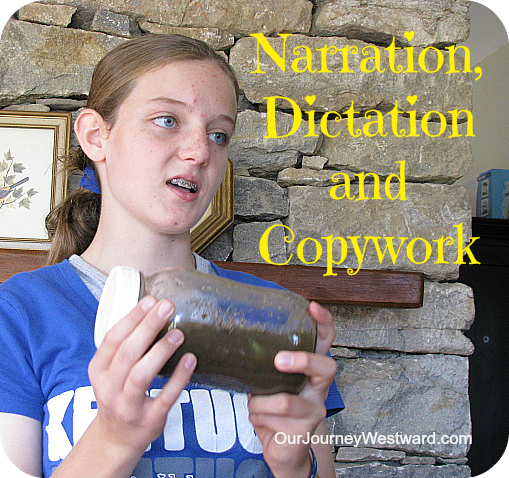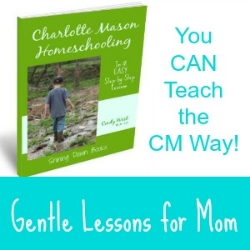Charlotte Mason Series #4 – Narration, Dictation and Copywork

Welcome back to the 10 Days of Homeschooling blog hop! You can find the previous posts from my Charlotte Mason series here.

I might as well go ahead and tell you that this is my weakest area. I didn’t want to leave it out of my series, though, because it truly is a very important aspect to the CM style! So let’s just get down to business…
Narration
Narration is simply retelling something in your own words. This is a very important skill for many reasons – it requires focused attention, encourages attention to details and information, helps a child organize his thoughts, and teaches him to speak clearly and expressively. Narration is quite easy.
- Read a sentence, poem, passage or chapter to your child, or have him read it himself. Once. This is key because you want him to listen well the first time.
- Encourage him to retell as much as he can remember in his own words, adding any opinions or comments as he wishes. (Mom should refrain from interruptions.)
Dictation
Dictation is meant to encourage attention to spelling, grammar and punctuation. A child is given a poem or passage and asked to read and reread until he feels comfortable with spelling all the words and adding the correct capitalization and punctuation. Mom then reads the passage one sentence at a time expecting her child to write it correctly. Incorrect spelling and grammar are corrected immediately so that bad habits don’t form.
Copywork
Copywork is meant to encourage handwriting, while at the same time reinforcing grammar and spelling. A child is given a sentence, poem or passage, depending on his ability, and is expected to simply copy it word for word, capital for capital, and punctuation for punctuation.
Older children replace copywork with transcription, which is simply reading a sentence and trying to rewrite it correctly without looking back at the original. Good sources for copywork include Bible verses, quotes, paragraphs from living literature, hymns, recipes and “whatever is pure, whatever is lovely…” Philippians 4:8
Benefits
In completing all three – narration, dictation and copywork – regularly, your child obviously grows in the skills of paying attention, recalling details, public speaking, grammar, spelling and handwriting. At the same time, when excellent materials are chosen, he will internalize such things as the qualities of good writing and moral character.

Why have I not been the best at incorporating these methods into my homeschool? Well, quite honestly it’s partly because of laziness on my part an partly because I load our day with lots of other things. Neither are great excuses. However, one of the most wonderful aspects of homeschooling is the freedom to choose what and how to teach. No matter what style of education I lean toward, I can mold it to fit the specific wants and needs of my family. Plain and simple. And I wouldn’t have it any other way! Even though these methods haven’t been a consistent part of our schooling thus far, I actually DO have plans to be more consistent with them as my four-year-old begins schooling because I recognize their great value.
What about you? Have you seen the benefits from using narration, dictation and copywork consistently? I hope you’ll come back tomorrow for the conclusion of the first week as we discuss Living Math!
Other Charlotte Mason Posts


I have seen the benefit of narration. Only…I need to let my son go with the flow instead of stepping in to correct him so much. I’ve now started letting him tell me what happened and writing it down, even if it’s not correct. I then go over it with him and have him tell me if he see’s anything that needs to be corrected. This has helped very much.
You’ve inspired me this week and I’m even reading my CM companion more! There is always room for me to improve.
Thanks for you CM posts this week! They have been very encouraging. My oldest is seven so we are just getting really started.
Would love to win that ticket! 😀
Good post!
I’m mostly an eclectic classical homeschooler, but I’m “exploring my Charlotte Mason side” this year.
Narration, Dictation & Copywork are things that I need to get around to more often. I want to. But I find myself fighting back and forth with doing things like this and purchasing actual language arts and grammer curriculums, with worksheets and quizzes to check and grade and show progress. That’s partially because in a way it’s easier (less one on one time and there are 3 kids needing my attention) and partially because I fight the *need* to have the graded papers and the “proof.” My husband likes to see the “proof,” too. But on the otherhand, if I had notebooks full of narration, copywork and dictation that would be proof enough right there, right? I guess I’m saying all this to ask, “do you ever feel the need to add a more in depth study of grammar than the grammer you pick up and acquire by copying good literature?” How do you balance these two ideas? Thanks. =)
I appreciate your honesty. We have started a small amount of “copy work” (my kids are K & Pre K). Mostly I want them to be comfortable with their letters by grade 1. I put quotations on copy work, because they are actually tracing right now, to reduce the frustration level. My Pre K only traces some of the words and then I help her with hand over hand to complete the rest. How did you start out? Do you use printing or cursive writing? What about typing? Just picking your brain. Thanks for your article.
Thanks for your time and efforts in the 10 day post of C.M.
You wrote about it so eloquently and practically, I’d never have known you don’t incorporate it as much as you’d like! Kudos to you!
this was inspiring as I was just talking to my 8 y.o. dd the other day about it. I was thinking about stopping it since I haven’t seen much fruit in the copy work area but this has inspired me to keep on keepin’ on!!!
Narration has been good as I’ve never said ‘Now, narrate for me.’ I just ask a few questions or ask what do you remember and she has been a willing student thus far.
Thanks again!
Looking forward to more posts next week.
Here’s my question: When do you start narration? My daughter is almost five and my son is six. My son has really gotten the hang of it and my daughter struggles with it a little, but might be catching on soon. Should I even be attempting narration with her at this age? I don’t correct her or ask her pointed questions about what I’ve read. If she doesn’t pay attention, I just go on. I only read small, easy to understand passages with her.
Copywork has worked really well with my oldest, the six year old and we are starting to work on dictation. I really enjoy this aspect of Charlotte Mason. I try to find copywork (or make it up) that is interesting for him. I’ve noticed alot of sites use scripture, which he’s good at memorizing, but I don’t think it would hold his attention for copywork.
Michelle
(ps – Can I put a link to your 10 days of charlotte mason on my blog – http://www.highheelsondirtroad.blogspot.com?
Have enjoyed the posts and it has inspired me to add more living books to our homeschool days. My boys have really enjoyed books that have come from “Books that Build Character.” We picked up a used copy of it and it has been a great resource to find some fun to read and quality literature with a real purpose behind the stories.
I will address this in the Q&A post.
I will answer these questions in the Q&A post.
I’ll answer these questions in the Q&A post.
Yes, keeping my hand over my mouth is tough for me, too!
As a new….reluctant,…and super freaked out over the idea of homeschooling mom…I want to say THANK YOU for these posts. They have helped me so much in trying to plan out the rest of my 2nd grader’s school year, and have provided a jumping off point for me. Thank you! Thank you!
Kati, you are so welcome! I’m glad they’ve helped. 🙂
What do you do instead? In terms of writing institution for grade 2?
Erica, oral narration, narration through drawing pictures, and storytelling are great ways to build creative skills in writing. I don’t expect kids to start writing anything besides copywork in grade 2. 🙂